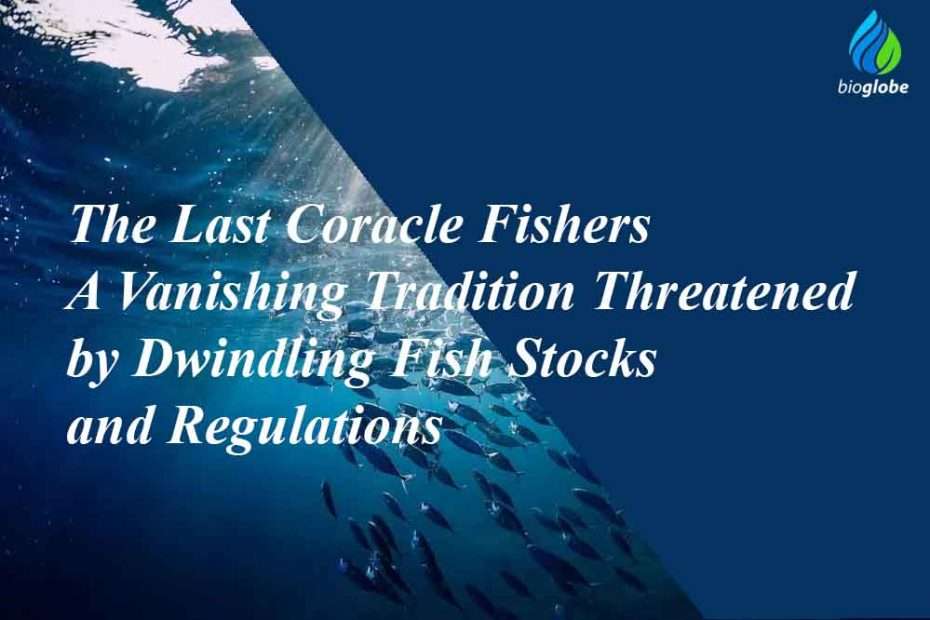“The Last Coracle Fishers – A Vanishing Tradition Threatened by Dwindling Fish Stocks and Regulations”
Introduction
As the sun sets on the serene Teifi River in Wales, a father and son, Len Walters and Aaron, prepare for another night’s fishing expedition. They meticulously check their gear – gumboots, head torches, a priest, and a drift net. However, their most essential equipment is a handmade coracle, carefully crafted from willow, hazel, and calico.
The Unique World of Coracle Fishing
Len whispers as they approach the riverbank, “The design on each river is different. The Teifi coracles are different from the Tywi ones, as we have faster water and more rapids. But they’re built the same as in the old days, only we don’t use cowhide anymore because it’s too heavy.”
Silently, the two men launch their coracles, delicately navigating the water with ash paddles, using a figure-of-eight stroke. They lower the net into the water, extinguish their torches, and disappear into the inky blackness downstream. For generations, coracles have been the vessels of choice for fishing salmon and sea trout, known locally as sewin, on three Welsh rivers: the Teifi, Tywi, and Taf. These lightweight, nimble boats are handcrafted, featuring a fabric skin stretched over a wooden frame, although fiberglass has replaced skin in some instances for added durability. Traditional twine nets have given way to nylon, weighted with coconut rope. Fishing is primarily a nocturnal endeavor to avoid alerting the fish, with most nights beginning at 11 pm and extending into the early hours of the morning.
The End of an Era
However, this ancient tradition, dating back centuries, may be on the brink of extinction. Concerned about the dramatic decline in fish stocks, Natural Resources Wales (NRW) has implemented bylaws to restrict fishing rights on the Teifi, Tywi, and Taf rivers. Since 2020, fishers have been required to release any salmon they catch, with size limits imposed on other species, including sea trout. The net fishing season has also been shortened to just three months, from May to July, compared to the previous March start for coracle fishers.
Unfortunately, the health of these rivers continues to deteriorate, prompting fears that even stricter regulations may be necessary, a prospect that terrifies the coracle fishers.
“It’s probably going to end within the next five years,” says Mark Dellar, a maker and netsman based in Cilgerran. “They’re talking about heritage licenses, where they’ll just restrict us off the river, like they did with the lave fishermen on the Severn. Unfortunately, that’s the way the powers that be want to play it.”
Grim Statistics
The statistics are sobering. According to NRW’s estimates, salmon numbers across Welsh rivers have approximately halved, with a more pronounced decline in recent years. In 2021, only 853 adult salmon returned to the Teifi to spawn, a stark contrast to the 3,000-plus recorded in 1994. Although sea trout numbers have proven more resilient, they too have witnessed significant recent declines.
The coracle fishers dispute these numbers, asserting that the estimates are inaccurate, mainly relying on rod-and-line returns, automated fish counters, and academic formulas such as “stock recruitment curves.” However, even the most optimistic among them concede that there are significantly fewer fish in the rivers than in their fathers’ and grandfathers’ time.
A Multitude of Factors
Numerous factors contribute to this decline, including pollution, habitat loss, compromised water quality, migration obstacles, and disease. However, climate breakdown emerges as the primary culprit, as salmon, reliant on cold water to spawn, face heightened vulnerability due to global warming. According to Andrew Thomas, restoration officer for the West Wales River Trust, without more stringent measures, salmon could vanish from these rivers entirely.
Looking to the Future
Thomas emphasizes, “Years ago, there was plenty of fish for everybody. But it’s coming to the point where we’re getting really worried about the future. Something’s got to be done, and we’ve all got a part to play in that.”
The pressing question remains whether banning coracle fishing will make a significant difference. With only 12 fishing licenses on the Teifi, eight on the Tywi, and one on the Taf, coracle fishermen argue that their numbers are too small to have a substantial impact compared to the greater numbers of rod-and-line anglers.
NRW’s Ben Wilson acknowledges that neither rods nor nets are solely responsible for the decline, but he believes that tighter restrictions may still be necessary to help these rivers recover. He states, “Our intention is to sustain these stocks into the future. Coracle fishing – and seine netting – is part of our heritage. As long as there are sustainable stocks to exploit, I hope those fisheries can operate. If there aren’t enough fish, I still hope we can find a way to keep those skills and that heritage going.”
A Gloomy Outlook
However, despite this glimmer of hope, Len Walters and his fellow coracle fishers remain pessimistic about the future. Walters laments, “If you take away the right to fish, you’ll no longer have people making coracles. And it’s such an amazing way to fish. All feel. No engines, no noises, just the skill of two boys in a coracle. And it’s sad because once it’s gone, it’s gone. It’ll never come back.”
Conclusion
The future of coracle fishing in Wales hangs in the balance as dwindling fish stocks, exacerbated by climate change, and increasingly stringent regulations threaten this ancient tradition. The fate of this unique craft and the rivers it plies remain uncertain, leaving the coracle fishers and conservationists grappling with how to strike a balance between preservation and tradition. As the last coracle fishers navigate the dark waters of the Teifi, they do so with the weight of history and a precarious future on their shoulders, knowing that once it’s gone, it’s gone forever.


